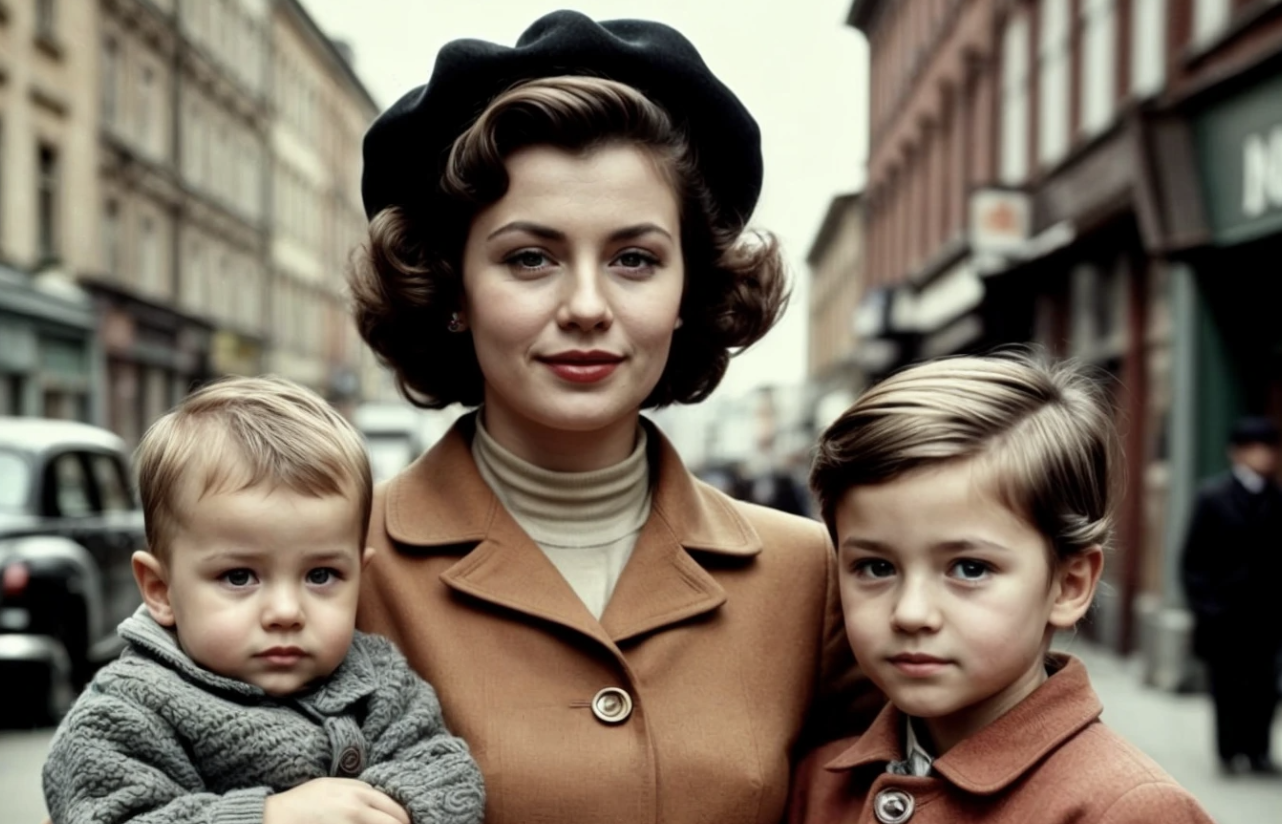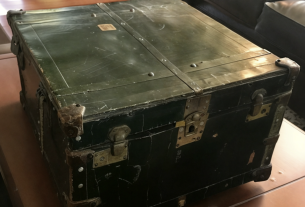“Finally,” I sighed, feeling the key turn in the lock.
Viktor entered the apartment, dropped his travel bag on the floor, and wearily rubbed his face. It had been six months since he left for his work rotation. Six months we hadn’t seen each other.
He smelled of expensive cologne, dust, and a foreign city. I wanted to rush to him and hug him, but one of the babies was asleep in my arms, and the other had already started crying in the crib.
“What is this…” Viktor stopped in the doorway of the room. His gaze slid from one cradle to the other. “Anya, what’s going on?”
I forced a nervous smile, carefully rocking my son. My heart was racing—I had prepared this moment for so long, dreaming he would be happy.
“A surprise. We have twins. Boys.”
He was silent. Didn’t come closer, didn’t look at the children’s faces. His expression, extinguished after the long journey, turned stone cold. He looked at the two cribs as if they were shattered wreckage of his plans.
“A surprise?” he repeated hollowly. “You call this a surprise? We agreed to have one child. I was counting on only one.”
“Vitya, it just happened. Is that bad? They’re our children. It’s double happiness.”
“Happiness?” he smiled bitterly, and a chill ran down my spine from the sound. “I worked six months in a harsh climate not for some ‘double happiness.’”
“I worked to pay off the mortgage, buy a car. Not to take on a burden for the next twenty years.”
His voice grew harsher.
“Did you even think about me? Who ever thought about me? I had plans! I wanted to start living for myself!”
Tears welled up in my eyes, but I held them back.
“Now our plans are them,” I nodded toward the children.
Viktor turned to the window. I saw his shoulders tense, his neck tighten. He didn’t look at them or me. He was staring at his shattered dream.
“No,” he said firmly, turning sharply. “Those are your plans. You gave birth to two—you raise them. I’m leaving. I want to live my own life.”
He didn’t yell, spoke calmly, matter-of-factly—making his words all the more painful.
Walking to the wardrobe, he flung open the door and began pulling out clothes, tossing them into the bag on the floor. T-shirts, sweaters, jeans—all flying in disarray.
“Vitya, wait! What are you doing? Come to your senses!” I took a step forward but stopped, not to wake the child in my arms.
“You come to your senses,” he threw over his shoulder. “I never agreed to this.”
He zipped the bag, grabbed it, and without even looking at me, headed for the door. I stood in the middle of the room, stunned, holding one son’s warm little body while the other started crying in the crib.
The door slammed.
I slowly sank onto the edge of the bed, my legs numb. For about ten minutes, I just sat, listening to the baby’s cries. Then I called my mother.
“Mom… can we move in with you? Forever.”
We arrived in the village greeted by the scents of smoke, freshly plowed earth, and old wooden walls. My parents’ house, with low doors and a crooked fence, became our new home.
The city apartment, where we suffocated in debts and hopes, was behind us. Here, time flowed differently—it was measured not by electronic clocks but by sunset, the first ice on the river, or the spring thaw.
Kirill and Denis grew like two young oaks—strong, a bit clumsy, indistinguishable to outsiders but completely different to me.
Kirill was serious, composed, doing everything carefully and maturely. He eagerly helped grandpa, learning the craft, loved precision and order.
Denis was the opposite: lively, bold, always moving. He was the first to climb trees, start games, and invent incredible homemade gadgets.
“Mom, look!” he shouted, flying across the yard on his homemade device, with Kirill following, tools in hand.
I taught at the local school, handling several subjects and grading notebooks at home. We lived modestly but with dignity.
Sometimes, sitting late at night with the notebooks under dim light, I caught myself wondering: what if Viktor had stayed? Would we be living in the city now, taking the boys to lessons, vacationing by the sea? But I pushed the thoughts away—they were like a shadow pulling me back.
My present was here—in the creak of the floor, the scent of wood from grandpa’s workshop, in two pairs of identical felt boots by the door.
One winter day, during a snowstorm, the window frame in the nursery broke. There was a crack, and a cold wind rushed in, blowing the curtain and bringing a whole cloud of snow. The boys ran out scared.
“No worries,” grandpa said, entering with a lantern. “We’ll nail it up for the night. Morning is wiser than evening.”
In the morning, he brought an old frame.
“Well, men,” he smiled, placing it on the workbench. “We’ll learn. A window is like a house’s eye. It must be clear and strong.”
The three of them spent the whole day in the workshop. Grandpa showed how to remove old moldings properly, how to clean the corners, how to fit the glass exactly. Kirill repeated every move with surprising attention.
Denis buzzed around, handing tools and chatting nonstop, but his eyes also sparkled with lively curiosity.
By evening, the window was installed. Not perfect, but sturdy.
“Looks great,” Denis exclaimed, looking at the garden through the new glass. “Even better than before!”
“Yeah,” Kirill agreed, running his finger along the smooth seam. “When we grow up, we’ll start our own business. We’ll make windows that no wind can break. The best in the region.”
I stood in the doorway listening to them. For the first time in many years, I felt not just resignation to fate but a real, warm feeling of pride. They would manage. Without him. They already were.
Nearly thirty years passed. Time softened the pain but didn’t erase the memories.
From that first clumsy window repair grew the company “OknaStroyGarant.” It was now known throughout the region. Kirill became its chief strategist—calm, thoughtful, leading negotiations, creating projects, implementing technologies.
His office was a model of tidiness. Denis, on the other hand, was the soul and driving force of the whole business: he oversaw production and installation teams, ran between construction sites, could lift huge glass panels alone, and had an incredible talent for reading people.
They remained a single whole—like two sides of the same coin.
I had long moved from my parents to a small house my sons built for me next to their spacious two-family cottage. I no longer worked at school—I helped Kirill with paperwork and my daughters-in-law with the grandchildren.
Every day I looked at my sons, their strong families, the business they built from scratch, and felt a warm confidence and pride inside. The story with their father had become something distant, almost fairy-tale-like, as if from another lifetime.
One day, as usual, I came to their office with lunch—roast chicken and fresh salad. Denis, as always, met me at the door and immediately took the containers.
“Mom, you’re a lifesaver!” he exclaimed. “Today’s so busy we didn’t even eat. We’re hiring a new team, and Kirill has been interviewing candidates for three hours.”
Looking into my son’s office, I saw him sitting at a large table with an elderly man in a worn jacket. I couldn’t see his face clearly, only the back of his head and nervous hands. But in his posture, in how he sat, there was something painfully familiar.
“There’s experience,” the man’s voice carried. “Worked everywhere possible. Been to the north when I was young… Life knocked me around.”
Kirill responded, and the man stood, turning toward me. Our eyes met. I froze. It was him. Viktor.
His face worn by time, deep wrinkles, faded eyes—but it was him. The man who left thirty years ago “to live for himself” had now come asking for a job from those he had abandoned.
I stepped back into the hallway, pressing my hand to my mouth to hold back a cry. Everything blurred before my eyes. Denis immediately noticed and ran over.
“Mom, what’s wrong? You’re shaking!”
I couldn’t speak. I only pointed with a trembling finger toward the exit where Viktor was already heading, not recognizing me.
That evening, the three of us gathered at my house. That conversation was the hardest in my life.
My sons listened silently. Their usually different expressions were now equally tense. I told everything—about his departure, those terrible words, about today’s meeting.
“We took him,” Kirill said after a pause. “Just as a fitter. Tomorrow is his first day. The last name… I noticed, but coincidences happen.”
“And now what?” Denis asked without looking at me.
“Nothing,” the older brother replied. “We’ll talk to him tomorrow.”
The next day they called Viktor to the conference room. I insisted on being there. I needed to see everything with my own eyes.
At the long table sat we—me and my two sons, the owners of a thriving business. A minute later Viktor entered. He wore new work clothes with the company patch.
Seeing me, he frowned, trying to remember, but his memory was blank.
“Sit down, Viktor,” Kirill said calmly, indicating an empty chair.
The man sat down, looking at us with curiosity and some hope.
“Tell me, Viktor,” Denis began, “do you have children?”
Viktor grimaced, looked away.
“No. Didn’t work out. I lived alone all my life. Work, travel. Lost my health, got nothing in return. Wanted to live for myself, you know… but it turned out I didn’t live at all.”
“Understood,” Denis nodded. “Probably had plans? Buy a car, rest somewhere?”
And then he thought: no, I don’t want to get involved. Especially if a child was born there. Or two. Then life would definitely turn into a prison, right?
Viktor flinched. For the first time, he really looked at Denis, then shifted his gaze to Kirill. And finally—to me. His face paled, eyes widened. He recognized.
“You… Anya? Is that you?!”
“We are your sons,” Kirill said evenly, but behind that calm voice hid years of pain. “The ones you abandoned to ‘live for yourself.’ So, did you live?”
Viktor clutched his head, rocking in his seat. “Children… sons… I didn’t know… I thought…”
“Enough,” Denis cut him off. He stood and walked to the window, beyond which the factory floor was visible. “Look there. We did all this ourselves. Without you. We grew up while you ‘searched for yourself.’ Studied, worked, fell and got up again. Built the factory, houses, started families. These are our plans. You once called them a burden.”
Kirill also stood.
“We won’t fire you. And we won’t seek revenge. We just wanted you to see everything with your own eyes. One day. Now you can leave. Take a day’s pay and don’t show up again. We don’t need you anymore. You’re extra in our lives.”
Viktor lifted his eyes to us, full of tears and belated remorse. He wanted to say something but couldn’t utter a word. Silently, he got up and, staggering, left the room.
We remained the three of us by the window. Denis hugged me by the shoulders; Kirill stood nearby. Outside, business bustle continued: machines hummed, forklifts rushed about.
A new future was being born there—strong and bright. And the old ghost was forever banished. He didn’t need forgiveness or revenge—our victory lay elsewhere. In ourselves.



